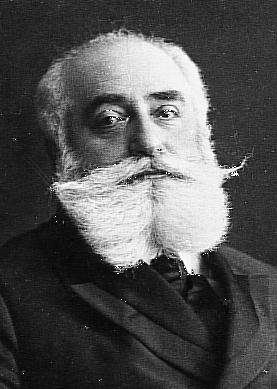
Max Nordau
(1849 - 1923)
Max Nordau was born in Pest, Hungary in 1849, the son of Gabriel Sudfeld, an Orthodox rabbi of Sephardi origin. Although given a good grounding in Jewish tradition, Nordau drifted away from the Jewish community. Initially he worked as a journalist but later decided to study medicine. In 1880 his studies took him to Paris where he opened a practice, even though it was in the literary field that he was to make a name for himself.
Nordau was considered a controversial writer with his attacks on contemporary European art, social and political behavior. His "Conventional Lies of Society", written in 1883 was an attack on irrationality, egotism and nihilism which he perceived as the evils of his time. By 1898 his works were translated into some 18 languages.
Nordau's Zionist conversion was an experience not dissimilar to Herzl's and he admitted that the rising tide of anti-Semitism had brought him back to realize his duties toward the Jewish people. When Herzl met with Nordau, it took little persuasion to convince the latter of the worthiness of the Jewish State idea.
Nordau soon became Herzl's partner in the Zionist movement playing a central role in defining the Basle program. At the first Zionist Congress, Nordau gave the opening speech on the condition of the Jewish people, which subsequently became a tradition at later Zionist Congresses.
At the Sixth Zionist Congress, Nordau defended Herzl's Uganda plan arguing that they offered a temporary solution to the Jewish people's sufferings. It was he who coined the term nachtasyl (night shelter) to describe the Uganda plan. Following Herzl's death, Nordau was offered the position of President of the World Zionist Organization but he declined preferring instead to serve as advisor to David Wolffsohn. He opposed the growing trend toward practical Zionism remaining faithful to Herzl's political program.
Nordau distanced himself from the Zionist movement but not from the idea. He last attended a Zionist Congress in 1911 and although resident in Spain during the First World War tried to maintain contact with the movement throughout that period. Weizmann attempted to bring him back into the organization at the end of the War; however, Nordau rejected the overtures, believing that the movement was a shadow of what Herzl had intended it to be.
In 1920 he raised the idea of evacuating half a million Jews from Europe to Eretz-Israel but no one took the idea seriously at that time. By then he had returned to Paris, where despite discussion of his immigration to Eretz-Israel he died after a long illness.
Courtesy of:
http://www.jewishvirtuallibrary.org/jsource/biography/nordau.html
